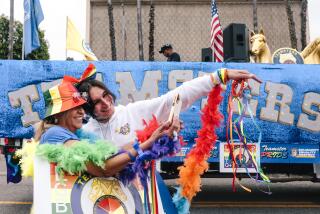Teamsters Reform Slate Receives Solid Support From Southland Local
A national reform movement within the Teamsters Union has scored its biggest victory by winning 14 of the 17 national convention delegate seats in a large Southern California Teamsters local.
The winning slate of delegates in 13,000-member Teamsters Local 63 is pledged to support Teamster presidential candidate Ron Carey, the head of a Long Island Teamsters local and the best-known critic of corruption within the nation’s largest trade union.
The election was notable because of the size of the local, because its history includes a violent attack on dissidents and because its leaders made an unusual strategic decision: They chose not to run as convention delegates, instead supporting a slate of lesser-known allies who narrowly lost. The victory by Carey’s campaign, which is closely aligned with the reformist Teamsters for a Democratic Union organization, represented the largest bloc of delegates Carey has won in any of the union’s 630 locals.
In two dozen other Teamsters locals in Southern California, Carey delegates have accounted for only four of the 153 chosen. In half those locals, no reform candidates attempted to run.
Most Teamsters delegate elections were completed by last week. Carey’s campaign claims that delegates pledged to him have won between 10% and 12% of approximately 2,000 delegates who will attend a presidential nominating convention in Orlando, Fla., in June. The bulk of the elected delegates are aligned with the leadership of their locals but in many cases have not campaigned as pledged delegates, making it difficult to measure the political makeup of the convention.
For the first time, the federal government is overseeing the way the Teamsters elect their international president and vice presidents. The 1.6-million-member union agreed to abide by federal rules when it settled a 1988 government racketeering lawsuit that charged that the union was hopelessly riddled with corruption and associations with organized crime.
In the past, the Teamsters elected their president at a convention attended almost solely by leaders of Teamsters locals. Contested votes were rare. But now delegates must be elected in each local and nominate national candidates by secret ballot in Orlando. The rank and file will vote on these candidates in local elections in December.
The democratization has split the national leadership into a number of increasingly spiteful factions. President William McCarthy of Boston, who is retiring, has endorseV. Durham, an international vice president from North Carolina, who has positioned himself as spokesman for the “clean regulars” of the Teamsters and is generally regarded as the leading candidate.
Other candidates include McCarthy’s former executive assistant, Walter Shea; William Genovese, former head of the Teamsters airline division, and James P. Hoffa, son of the late Teamsters President Jimmy Hoffa. Hoffa, an attorney who works for Teamsters locals in Michigan, does not appear to meet the union’s eligibility requirement of having worked “in the craft.” A ruling on his eligibility by government attorneys overseeing the election is pending.
Local 63 is one of the largest locals of any labor union in Southern California, stretching from Palm Springs to Bakersfield and representing workers ranging from bakery drivers to freight handlers to supermarket truck drivers.
The local’s history includes a violent clash in 1985, in which a group of dissident members planning to run for local offices were kicked, stabbed and beaten on their way to a meeting. The members sued and three years later a federal court jury ordered the local to pay $768,000 to the nine injured members.
The chief executive of Local 63, Bob Marciel, who has headed the local since 1979, was criticized Monday by other Teamsters officials for not putting himself on the ballot as a delegate candidate. Sources familiar with Marciel said he was preoccupied with another election--he will be running for reelection as the local’s secretary treasurer later this year--and did not want to risk political damage by participating in the hotly contested delegate race.
“Marciel got cocky. He thought his rank-and-file slate could win without his name on it. But the slate needed his name recognition,” said one Teamsters official, speaking on the condition that he not be identified.
The Carey slate campaigned on a platform that included eliminating multiple pensions and multiple salaries enjoyed by many union officials, along with increasing strike benefits. Literature distributed by the slate informally affiliated with Marciel suggested that two Carey delegate candidates were illiterate, identified another as a recovered alcoholic and ridiculed a fourth for belonging to a nudist colony.


